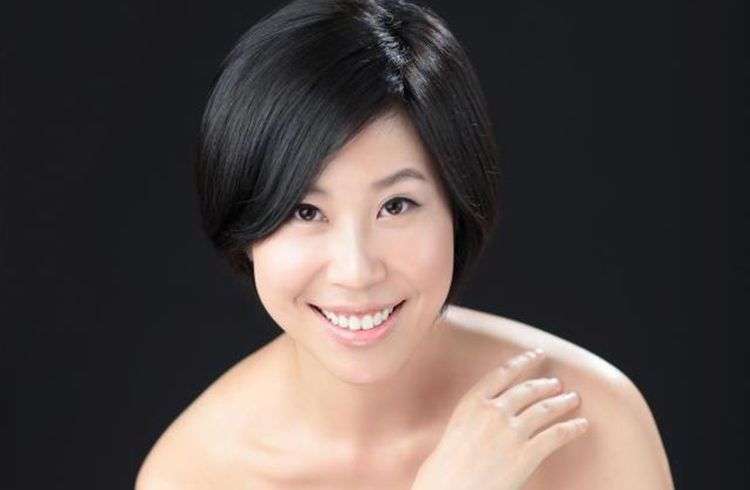There is a Shanghai Chinese woman living in New York who plays the piano sometimes diabolically, and sometimes in a slow but angelical way. She has gone upstream with her contemporary classical music in a China of ancient traditions. Her performance desire takes objects like baseball gloves and balls and strikes the keys hardly; she strikes what was not made to be struck. She gets uneasy while playing, stands up, grabs the ropes and makes them vibrate on her own hand. But this does not matter if through this act she manages to invent the most sacrilegious sounds that can be collected from a piano.
It was through Dr. Solomon Mikowsky, one of the professors who most influenced on her at the Manhattan School of Music, that she learned that there was a Mr. Leo Brouwer, living south , who was the epicenter of a chamber music festival bearing that same name. Perhaps because Dr. Mikowsky is Cuban, and in many of his classes he told incredible stories of the island and his childhood there, maybe because the professor, in an outburst of nostalgia, told the student: “I am sure that Brouwer would love you to go to the festival”, and he added: “If you go and play there, you would make me proud a lot.”
The day : Tuesday October 7th. The time: 8:30 pm. Place: Martí Theatre. There will be Jenny, accompanied by flutist Niurka González, the Havana Chamber Orchestra, Angklung Orchestra of Camagüey and other guests. Playing in Cuba has been a unique opportunity for her and therefore she says the organization of the concert has been taken very seriously: “I’ve been trying different options, from various perspectives; I even changed the program twice. Finally, I am satisfied with the final version, which includes a first part dedicated to anti-war theme, and a second one to the people who stay strong, happy and optimistic in all circumstances. ”
“For this I have asked a few and great composers to write about those two topics. One is Theodore Wiprud with the song Jump, and the other is Richard Sussman, with Spirit Guide, so there will be some world premieres at the concert. Another piece that stands out is Juicy, by Jarowslaw Kapuscinski. This one is accompanied by a video where the elements of audio and image are equalized with electronic sounds controlled by an artificial intelligence program, Antescofo, developed by composer Marco Stroppa.
“I feel that, although I do not know very well the Cuban music school, I carry something of it with me, and that’s the influence of my teacher Dr. Mikowsky, who has played for me some of that repertoire. I remember he once gave me a rumba to play as part of the additional program in a concert in Shanghai. I know that Cuba is quite rich in its culture and music, but I’ve never had the opportunity to have such experience. This is the first time, and I am thrilled with it.
“Moreover, the work of the Festival have greatly impressed me, it seems so great. Through it, artists and musicians from around the world are attracted, especially from the United States, which is more difficult. Both cultures as people need the exchange.
“The reason for which I founded the Face Art Institute of Music in my country has much in common with Brouwer´s draft, the idea is that the Face Art to serve as a meeting point for artists, as a bridge for students and audience from there. We have been growing and impacting to the point that many musicians and even prime ministers of China have visited us. Our students have won over 60 awards, have the opportunity to meet other countries, make friends and manage to influence each other. ”
From where comes the idea of experimenting with objects to create new sounds ?
“The idea, really, did not start with me. Maybe it did it with Beethoven or Mozart, or even earlier. The truth is that throughout history, people have tried to find and create new sounds with the piano. In the twentieth and twenty-first centuries, the technology can make a major difference, by complementing the music with electronic sounds and visual effects in order to expand the ever growing horizon of piano melodies and harmonies. ”
In presence of such unpredictable artist, the classic question that closes most of the interviews cannot miss: the one about future projects. Again, Jenny surprises when talking about her partnership with Ian Fenty, a scientist at Massachusetts Institute of Technology (MIT) and the National Aeronautics and Space Administration (NASA): “The goal is to combine music and science, with the topic of the environment and the effect of global warming on the water. Hence the program is called Aqua Water.
“The other project is with Marco Stroppa, electronic music composer and also scientist at MIT. With him I was fascinated by electronic sounds and musical concepts from the futurism and space, so I’ll record an album with this kind of music, always played from the piano, very soon. ”
You once said you were just a performance artist who used the piano as a tool. And I ask you, why the piano?
It is an instrument that has lived through several centuries, and has been expressed in many different ways by composers from different cultures, histories and circumstances. Somehow, I find it spirits and ghosts, and a lot of agony and hope. Moreover, the fact is that, practically speaking, the piano is the instrument that I play the best.










